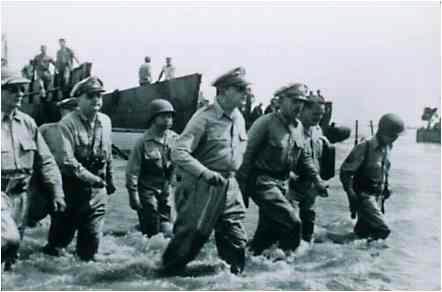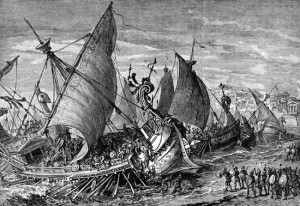In my continuing study of great men and women in history, I would like to share one of my favorite stories about the life of General Douglas MacArthur. His leadership exemplifies the type of courageous leadership we desire to build within the LIFE Business. With leaders like Chris Brady, Tim Marks, and Claude Hamilton, I am confident we are on our way. I hope you enjoy the article and keep growing personally and professionally to fulfill the purpose God created you for.
Sincerely,
Orrin Woodward

General Douglas MacArthur
General Douglas MacArthur was one of the greatest generals in American history. His bravery, boldness, and strategies won many battles for America. Interestingly, one of his most most daring battle strategies was one of his last. Pretty impressive when one considers he served in the military for over 40 years. The events leading up to MacArthur’s moment was North Korea’s invasion of South Korea in the summer of 1950. United Nation (UN) forces pushed back and pinned down in the tiny southeast corner of the Korean peninsula, called the Pusan Perimeter. With little room to maneuver or conduct offensive operations, men were being slaughtered on both sides with no breakout in sight. General MacArthur’s plan, an amphibious landing at Inchon, was not only was genius in its conception, but courageous to the point of foolishness in execution. Indeed, rarely does God create, in a person, a stronger mixture of brains and bravery than Douglas MacArthur.
Why did the proposed amphibious landing at Inchon border on madness? For many different reasons, namely, every significant factor the navy researches before amphibious operations pointed against the proposed landing at Inchon. From a narrow approach channel, strong currents, massive fluctuation in tides, city landing with sea walls instead of beaches, and an easily mined bay, these concerns made even the most courageous cower in fear. In fact, one of the gunnery officers said afterward, “We drew up a list of every natural and geographic handicap – and Inchon had them all!” The communications officer concurred, remarking, “Make up a list of amphibious ‘don’ts’ and you have an exact description of the Inchon operation.” MacArthur, undaunted, ignored such criticisms, noting the Japanese had performed amphibious landings at Inchon back in 1904. Naval officers were at a loss as to how to explain to MacArthur that, in 1904, ships had a significantly shallower draft than in 1950.
When the Joint Chiefs were informed of MacArthur’s planned invasion point, they were not amused, quickly sending several members to MacArthur’s to temper his “rashness.” I will quote William Manchester’s masterful description of the scene from his classic book American Caesar:
Lesser naval officers took the floor to point out that the General’s objective violated all seven criteria set forth in the USF-6, their amphibious bible. CINFE’s officers (MacArthur’s men) were glum and silent. Finally, after nine critics had completed an eighty-minute presentation, MacArthur rose. Afterward he wrote: “I waited a moment or so to collect my thoughts. I could feel the tension rising in the room. Almond shifted uneasily in his chair. If ever a silence was pregnant, this one was. I could almost hear my father’s voice telling me as he had so many years before, ‘Doug, councils of war breed timidity and defeatism.’”
Of the thirty-minute performance which followed, Doyle said, “Of MacArthur had gone on the stage, you never would have heard of John Barrymore.” The General began by telling them that “the very arguments you have made as to the impracticalities involved” confirmed his faith in the plan, “for the enemy commander will reason that no one would be so brash as to make such an attempt.” Surprise, he said, “is the most vital element for success in war.” Suddenly, he was reminding them of a lesson they had all learned in grammar school: “the Marquis de Montcalm believed in 1759 that it was impossible for an armed force to scale the precipitous river banks south of the then walled city of Quebec, and therefore concentrated his formidable defenses along the more vulnerable banks north of the city. But General James Wolfe and a small force did indeed come up the St. Lawrence River and scale those heights. On the Plains of Abraham, Wolfe won a stunning victory that was made possible almost entirely by surprise. Thus he captured Quebec and, in effect, ended the French and Indian War. Like Montcalm, the North Koreans would regard an Inchon landing as impossible. Like Wolfe, I could take them by surprise.
MacArthur was scintillating, converting nine skeptics into new believers through his belief and oratory powers. At one point, MacArthur pointed to an Inchon Map on the wall and said he would take full responsibility for failure and would withdraw the forces immediately if necessary. The men objected, saying it wouldn’t be necessary because they would get the job done. Minutes before, these same men were hesitant and fearful, now under the leadership spell of MacArthur, they believed they could pull of a miracle. Intuitively understanding when to finish, MacArthur closed, whispering, “I can almost hear the ticking of the second hand of destiny. We must act now or we will die. . . Inchon will succeed. And it will save 100,000 lives.” Over a minute of dead-silence followed before Sherman, one of the Joint Chiefs sent to dissuade MacArthur, answered, “Thank you. A great voice in a great cause.” Inchon was now moving forward and South Korea’s future hung in the balance.
As MacArthur predicted, the Inchon landing, on September 15, 1950, caught the North Korean’s completely by surprise. In the subsequent battle for the city, 566 men were killed and 2,713 wounded on the UN side. In contrast, the North Korean’s lost over 35,000 men killed or captured. Advancing inland, the UN forces captured Seoul on September 25, breaking the North Korean’s stranglehold. Thanks to the courageous landing at Inchon, the 8th army broke out from the Pusan Perimeter, sending the North Korean’s into a hasty retreat out of South Korean land. In fact, MacArthur men crushed the North Korean army, forcing China to enter the fray to save North Korea from extinction. Despite great risk to his reputation, his men, and his country, MacArthur’s bold plan had, not only saved South Korea from annihilation, but reversed the fortunes of the entire war.
Few men in history, especially this late in a great career, have displayed courageous leadership any better. General Douglas MacArthur was a man who followed his convictions, despite potential downside risk. He believed right makes might, not might makes right. Because of his leadership and strategy, South Korea is free today. Does leadership matter? Just ask the hundreds of thousands of men who are alive today because of MacArthur’s leadership. In today’s society, we need thousands more men and women who will lead like MacArthur. His example inspires each of us to step out of our comfort zones and lead. The ability is undoubtedly already inside of us, the question is: will we bring it out?











